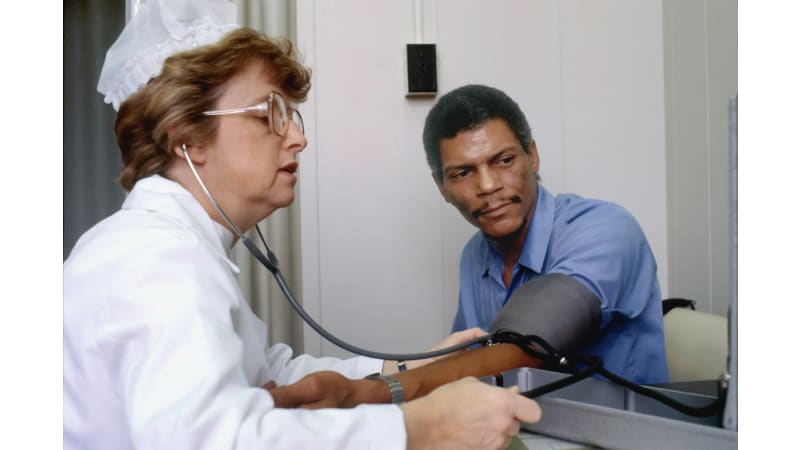How to Become a Nurse Practitioner

Key Takeaways
- To become a nurse practitioner, students must earn an undergraduate nursing degree and becoming a registered nurse.
- Aspiring nurse practitioners must pursue a master’s or doctoral program, choose a specialty, and obtain NP certification.
- It typically takes about eight years to become a nurse practitioner.
Without a clear understanding of what it takes, aspiring nurse practitioners risk wasting time, resources, and opportunities pursuing outdated or unsuitable routes. Based on the experience and information from nursing industry professionals, here is a guide on how to become a nurse practitioner to help you build an advanced nursing career.

How to Become a Nurse Practitioner
The journey to becoming a nurse practitioner begins with earning an undergraduate nursing degree and becoming a registered nurse. After gaining clinical experience, aspiring NPs must pursue a master’s or doctoral program, choose a specialty, and obtain NP certification. Maintaining credentials and engaging in continuous professional development can lead to long-term success in this field.
A clear roadmap to becoming a nurse practitioner can provide motivation and confidence, helping you persist through the challenges of advanced nursing education and training. We’re here to help keep things simple, guiding you with a step-by-step process of what it takes to become a nurse practitioner.
| Steps | Description | Typical Duration |
|---|---|---|
| Finish an undergraduate degree | Obtain a BSN or an RN-to-BSN degree | BSN (4 years) RN-to-BSN (1-2 years) |
| Become an RN | Pass the NCLEX-RN exam | 3 to 6 months |
| Gain experience | Work as an RN in a clinical setting | 1 to 2 years (minimum) |
| Earn an MSN or DNP | Complete a master’s or doctoral program in nursing | Average of 2 years |
| Specialize | Select an NP specialty (example: family, pediatric, emergency) | During an MSN/DNP program |
| Obtain certifications | Pass state certification in a chosen specialty | 3-6 months |
| Maintain credentials | Complete continuing education and renew certifications/licenses | Continuous |
Earn an Undergraduate Nursing Degree
To start your journey as a nurse practitioner, you’ll need to get a nursing degree. This is a vital step that provides the foundation for your advanced practice.
Bachelor of Science in Nursing
A bachelor of science in nursing (BSN) serves as a foundational step towards becoming a nurse practitioner by providing a comprehensive nursing education. It lays down the necessary groundwork for advanced practice nursing and is typically a prerequisite for entering an NP program.
A four-year BSN curriculum often covers a strong foundation in nursing science, ethics, and evidence-based practice. It also teaches critical thinking and clinical reasoning skills. Expect to study courses in anatomy and physiology, pharmacology, healthcare policy, clinical nursing, patient care and assessment, and community health.
RN to Bachelor of Science in Nursing
Do you have an associate’s degree in nursing (ADN)? We have evaluated the best online RN-to-BSN programs to enhance your nursing skills and improve your opportunities for future roles in healthcare, including becoming an NP.
This bridge program builds upon an RN’s existing knowledge and experience, filling in gaps in theoretical knowledge and research skills. Completing an RN-to-BSN program positions nurses to pursue graduate education necessary for NP licensure, often allowing them to do so faster than traditional BSN students due to their prior nursing experience.
Become a Registered Nurse
Before you can advance your nursing career to become a nurse practitioner, you’ll need to obtain your licensure as a registered nurse (RN). This step paves the way for your future specialization and advanced practice roles.
NCLEX Examination
Register with the National Council of State Boards of Nursing (NCSBN) to take the NCLEX-RN exam. The NCLEX-RN is a computer-adaptive test that adjusts to your skill level as you answer questions.
- Prepare diligently, focusing on the exam’s content areas like health promotion and maintenance, psychosocial integrity, and physiological integrity.
- Schedule your exam at an authorized testing center. Remember, you can choose your test date based on your preparedness and schedule.
- Be ready for a variable number of questions as the test ends when it’s determined with 95% confidence that performance is either above or below the passing standard.
After taking the test, wait for the official results from your state board of nursing to confirm if you’ve passed the exam and are eligible for RN licensure.
Gain Clinical Experience
After you’ve completed your formal education, getting hands-on experience is another significant step of becoming an NP. This experience allows you to practice real-life nursing skills under supervision and to handle advanced care scenarios confidently.
Practical Training and Supervision
During your practical training, you will be under the watchful eye of seasoned professionals. You’ll learn to apply your knowledge in a variety of clinical situations and receive immediate feedback to refine your skills. Prepare for these important factors:
- Preceptorship: Seek a mentorship with an experienced nurse practitioner who can guide you.
- Clinical hours: Accumulate the required clinical hours mandated by your graduate program.
- Diverse settings: Try to work in different healthcare environments to broaden your skills.

Advanced Procedures and Patient Care
Mastering advanced procedures establishes that you can provide comprehensive care to patients. You will perform tasks while learning how to design treatment plans and follow up on patient progress. During this training, you will:
- Learn procedures like catheter insertions, suturing, and interpreting diagnostic tests.
- Hone your bedside manner, assessment, diagnosis, and treatment planning abilities.
- Stay current with the latest healthcare practices through workshops and seminars.
Finish an MSN or DNP
After earning your BSN, you’ll need to pursue further education to become a nurse practitioner. Most employers require a master of science in nursing (MSN). You can also pursue a doctor of nursing practice (DNP) degree, which is an optional, more advanced program.
While both degrees qualify you to become a nurse practitioner, choosing between an MSN and a DNP will depend on your career goals, the time you can commit, and the role you want to have in the future.
Each program has its own prerequisites and credit requirements, so do evaluate if the respective programs will align with your ambitions.
Master of Science in Nursing (MSN):
Getting an MSN is the next step in becoming a nurse practitioner. We have found the best master of science in nursing degrees that provide advanced education and clinical training beyond the bachelor’s level. It typically requires two to three years to complete, including specialization.
This degree program typically focuses on specialized knowledge in a particular area of nursing practice, such as family care, pediatrics, or mental health. An MSN:
- Prepares nurses for the expanded responsibilities of an NP role, including diagnosing conditions, prescribing medications, and managing patient care.
- Offers in-depth coursework in advanced pathophysiology, pharmacology, and health assessment.
- Provides supervised clinical practicum hours necessary for NP certification.
- Develops leadership and research skills applicable to advanced practice nursing.
- Meets the minimum educational requirement for NP licensure in most states.
Doctor of Nursing Practice
A doctor of nursing practice degree is the highest level of clinical nursing education and can significantly enhance your journey and chances of becoming a nurse practitioner. This terminal degree focuses on evidence-based practice, quality improvement, and systems leadership, preparing nurses for the most advanced clinical roles.
With a DNP, you can take on roles in healthcare policy, administration, and education. A DNP can provide a competitive edge as it:
- Offers the most comprehensive preparation for complex patient care and healthcare leadership.
- Emphasizes the application of research to clinical practice, improving patient outcomes.
- Helps students develop skills in healthcare policy, informatics, and interprofessional collaboration.
Choose a Specialty
As a nursing major, you will come across a range of fields you can specialize in, each offering unique opportunities to impact patient care. Your choice will shape the trajectory of your career and the type of care you provide.
Family
Specializing as a family nurse practitioner (FNP) allows you to provide comprehensive primary care to patients, from infants to older adults. This versatile specialization lets you:
- Conduct health assessments, diagnose conditions, and develop treatment plans for patients.
- Provide preventive care, including immunizations and health screenings.
- Manage chronic diseases and coordinate care with specialists as needed.
Pediatric and Neonatal
Focusing on pediatric and neonatal care equips you with specialized skills to treat infants, children, and adolescents. To address unique health needs and developmental stages, you will:
- Perform well-child exams, developmental assessments, and growth monitoring.
- Diagnose and treat common childhood illnesses and manage chronic pediatric conditions.
- Provide care for premature infants and newborns with complex medical needs in NICU settings.
Adult-Gerontology
Do you want to focus on age-related health issues and chronic disease management? This specialization addresses the complex health needs of an aging population as you:
- Conduct comprehensive geriatric assessments and manage complex, chronic conditions.
- Provide primary care services, including health promotion and disease prevention for adults.
- Collaborate with interdisciplinary teams to address the multifaceted needs of older adults.

Mental Health and Psychiatric
This in-demand specialization addresses the growing need for mental health services to reduce the stigma surrounding mental illnesses. As a mental health and psychiatric NP, you will:
- Conduct psychiatric evaluations and diagnose mental health disorders.
- Develop and implement treatment plans, including psychotherapy and medication management.
- Provide crisis intervention and collaborate with other healthcare providers for comprehensive care.
Oncology
Specializing in oncology prepares you to provide specialized care for cancer patients, including symptom management, treatment support, and survivorship care. As an oncology NP, you can make a significant difference in the lives of cancer patients as you:
- Administer and monitor chemotherapy and other cancer treatments.
- Manage treatment side effects and provide symptom relief.
- Offer patient and family education about cancer diagnosis, treatment options, and prognosis.
Women’s Health
Focusing on women’s health makes you an expert in addressing the unique health needs of women throughout their lives. This NP specialization prepares you to support women’s physical and emotional well-being as you:
- Provide prenatal care, family planning services, and menopausal management.
- Perform gynecological exams, breast cancer screenings, and other preventive care.
- Diagnose and treat conditions specific to women’s health, such as polycystic ovary syndrome (PCOS) or endometriosis.
Emergency and Critical Care
Specializing in emergency and critical care prepares you to work in emergency departments or intensive care units. This challenging specialization enables you to:
- Perform rapid assessments and initiate emergency treatments for critically ill or injured patients.
- Manage complex medical equipment and interventions in ICU settings.
- Collaborate with interdisciplinary teams to provide comprehensive emergency and critical care.
Obtain NP Certification
After completing your advanced nursing education, you’ll need to get the right certification and state license to practice as an NP. Your certification demonstrates that you meet the standards described in a state’s laws.
The purpose of this certification from the American Academy of Nurse Practitioners Certification Board (AANPCB) is that it guarantees an NP meets standardized educational, clinical, and professional requirements to provide safe and competent patient care.
The process typically involves completing an accredited NP program. Requirements vary by state, with some states offering full practice authority while others require collaborative agreements with physicians. NP licensure may include prescriptive authority, often with additional requirements for controlled substances.
Maintain Credentials and Continue Professional Development
To stay active as a nurse practitioner, you must keep up with education and renew your certifications regularly.
Continuing Education
NPs need to obtain a certain number of continuing education (CE) credits within a specific timeframe to keep up with the latest practices and medical research in the field. You can earn CE credits through workshops, seminars, mentoring programs, and online courses. Save documents that prove you’ve completed your CE credits.
We also recommend learning by collaborating with colleagues or joining professional groups to exchange knowledge and experiences. Stay involved in research to enhance your practice and contribute to the nursing profession’s body of knowledge. Some employers also offer in-house training sessions and mentoring programs.
Certifications and Licensure Renewals
Your certifications and license are proof of your ability to practice as an NP. It will be your responsibility to:
- Know when your license and certifications expire to renew on time.
- Check the specific requirements of the American Association of Nurse Practitioners or your local regulatory board.
- Pay any necessary fees associated with renewing your license and certifications.

Related Questions
What Are the Roles of Nurse Practitioners in Healthcare?
Nurse practitioners are advanced practice registered nurses who provide a wide range of healthcare services similar to those of a physician. They diagnose and treat medical conditions, prescribe medications, and often serve as a patient’s primary healthcare provider. Many NPs specialize in specific areas such as family practice, pediatrics, or geriatrics.
How Much Does a Nurse Practitioner Make?
A nurse practitioner’s average annual salary is $126,260. However, this still depends on your experience, specialty, and work location. Consider applying for jobs in the highest-paying states for nurses.
How Long Does It Take to Become a Nurse Practitioner?
Becoming a nurse practitioner takes around at least eight years. After completing a four-year bachelor’s degree, you’ll need to obtain a registered nurse (RN) license. This is followed by a graduate program, work experience, and certifications, which collectively take at least four years to complete.
Conclusion
Knowing how to become a nurse practitioner opens up opportunities for advanced practice nursing and specialized patient care. As you dedicate time to your nursing education, clinical experience, licensure and certifications, specialization, and continuous professional development, you can eventually build yourself a rewarding career as a nurse practitioner and significantly impact patient outcomes.